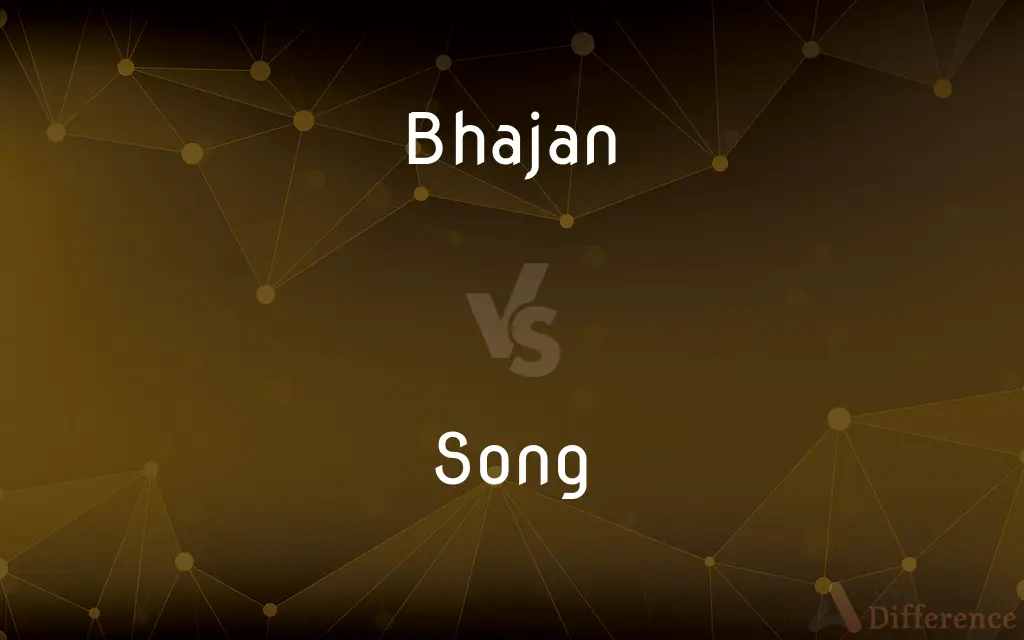Bhajan vs. Song — What's the Difference?
By Maham Liaqat & Urooj Arif — Updated on March 26, 2024
A Bhajan is a devotional song in Indian traditions, focusing on spiritual and religious themes, whereas a song is a broader term for musical compositions.

Difference Between Bhajan and Song
Table of Contents
ADVERTISEMENT
Key Differences
A Bhajan is a type of devotional song deeply rooted in the Indian cultural and spiritual tradition, often expressing love, devotion, or praise towards a deity or divine figure. While a song, in its broadest sense, is a musical composition intended to be performed by the human voice with or without instruments and can cover an array of themes, from love and war to nature and philosophy.
Bhajans are characterized by their simple melodies and soulful lyrics, which are typically composed in regional languages and dialects of India, making them highly accessible to a wide audience. Songs, on the other hand, can vary greatly in their complexity and structure, including their melody, harmony, rhythm, and the language in which they are written.
The purpose of a Bhajan is to evoke feelings of devotion and connection with the divine, serving as a medium for spiritual practice and expression. Songs serve a variety of purposes, including entertainment, artistic expression, social commentary, and more, without necessarily having a spiritual or religious focus.
Bhajans often involve group singing or call-and-response sessions, which encourage communal participation and a collective spiritual experience. Conversely, songs can be performed solo or by groups and may not always aim to create a sense of community or shared experience among listeners.
The instrumentation of Bhajans is typically traditional, incorporating instruments like the harmonium, tabla, and dholak, which complement the devotional atmosphere they seek to create. In contrast, songs can be accompanied by a wide range of musical instruments, from classical to modern, depending on the genre and the desired sound.
ADVERTISEMENT
Comparison Chart
Definition
A devotional song in Indian tradition.
A musical composition for vocal performance.
Themes
Spiritual and religious.
Diverse, including love, nature, social issues, etc.
Purpose
To evoke devotion and a spiritual connection.
Entertainment, artistic expression, social commentary.
Language
Regional languages and dialects of India.
Any language.
Performance Style
Often involves communal singing and call-and-response.
Solo or group performance without communal participation.
Instrumentation
Traditional Indian instruments like harmonium, tabla.
Diverse, from classical to modern instruments.
Compare with Definitions
Bhajan
Often performed in groups to enhance spiritual connectivity.
The community gathered in the evening for the bhajan session.
Song
Performed solo or by groups, often for entertainment.
The singer captivated the audience with a beautiful rendition of a popular song.
Bhajan
Devotional song in Indian traditions, focusing on spiritual themes.
The bhajan, sung in praise of Lord Krishna, brought tears to the devotees' eyes.
Song
A musical composition intended to be performed vocally.
The band's new song topped the charts for weeks.
Bhajan
Utilizes traditional Indian musical instruments.
Accompanied by the harmonium and tabla, the bhajan resonated throughout the temple.
Song
Can cover a wide array of themes and subjects.
Her favorite song about unrequited love echoed her own feelings.
Bhajan
Aims to invoke a deep spiritual experience.
Singing the bhajan filled him with a sense of peace and devotion.
Song
Accompanied by a variety of musical instruments.
The song featured an intricate piano solo that added depth to its melody.
Bhajan
Lyrics are usually in regional Indian languages.
The bhajan, written in Sanskrit, praised the goddess Durga.
Song
Serves multiple purposes, including artistic expression.
The artist used the song to voice his concerns about environmental issues.
Bhajan
Bhajan refers to any devotional song with religious theme or spiritual ideas, specifically among Indian religions, in any of the languages from the Indian subcontinent. The term bhajanam (Sanskrit: भजनम्) means reverence and originates from the root word bhaj (Sanskrit: भजति), means to revere, as in "bhaja govindam".
Song
A song is a musical composition intended to be performed by the human voice. This is often done at distinct and fixed pitches (melodies) using patterns of sound and silence.
Bhajan
(music) A type of Indian devotional song.
Song
A dynasty that ruled in China AD 960–1279.
Song
A brief composition written or adapted for singing.
Song
The act or art of singing
Broke into song.
Song
A distinctive or characteristic sound made by an animal, such as a bird or an insect.
Song
Poetry; verse.
Song
A lyric poem or ballad.
Song
A musical composition with lyrics for voice or voices, performed by singing.
Thomas listened to his favorite song on the radio yesterday.
Song
(by extension) Any musical composition.
Song
Poetical composition; poetry; verse.
Song
The act or art of singing.
Song
A melodious sound made by a bird, insect, whale or other animal.
I love hearing the song of canary birds.
Song
(ornithology) The distinctive sound that a male bird utters to attract a mate or to protect his territory; contrasts with call; also, similar vocalisations made by female birds.
Song
A low price, especially one under the expected value; chiefly in for a song.
He bought that car for a song.
Song
An object of derision; a laughing stock.
Song
That which is sung or uttered with musical modulations of the voice, whether of a human being or of a bird, insect, etc.
Song
A lyrical poem adapted to vocal music; a ballad.
Song
More generally, any poetical strain; a poem.
The bard that first adorned our native tongueTuned to his British lyre this ancient song.
Song
Poetical composition; poetry; verse.
This subject for heroic song.
Song
An object of derision; a laughingstock.
And now am I their song, yea, I am their byword.
Song
A trifle; an insignificant sum of money; as, he bought it for a song.
Song
A short musical composition with words;
A successful musical must have at least three good songs
Song
A distinctive or characteristic sound;
The song of bullets was in the air
The song of the wind
The wheels sang their song as the train rocketed ahead
Song
The act of singing;
With a shout and a song they marched up to the gates
Song
The characteristic sound produced by a bird;
A bird will not learn its song unless it hears it at an early age
Song
A very small sum;
He bought it for a song
Song
The imperial dynasty of China from 960 to 1279; noted for art and literature and philosophy
Common Curiosities
Can a Bhajan be considered a song?
Yes, a Bhajan can be considered a type of song, specifically a devotional one within the context of Indian music.
How do Bhajans differ from regular songs?
Bhajans specifically focus on spiritual and religious themes and are part of the Indian devotional tradition, whereas songs have a broader range of themes and purposes.
What instruments are typically used in Bhajans?
Traditional Indian instruments like the harmonium, tabla, and dholak are commonly used in Bhajans.
Are songs always about entertainment?
Songs can be for entertainment but also serve purposes like artistic expression, storytelling, and social commentary.
Can Bhajans be sung in languages other than Indian languages?
Traditionally, Bhajans are sung in Indian languages, but adaptations or inspired compositions can be in other languages.
Can songs have spiritual themes like Bhajans?
Yes, songs can have spiritual themes, but Bhajans are specifically designed for devotional purposes within the Indian spiritual context.
What is a Bhajan?
A Bhajan is a devotional song in the Indian tradition, often sung in praise of deities and focusing on spiritual themes.
What role does the audience play in a Bhajan performance?
The audience often participates in Bhajan performances, especially in call-and-response sessions, creating a communal spiritual experience.
Is there a specific occasion for singing Bhajans?
Bhajans can be sung on various religious occasions, daily devotional practices, and during festivals in India.
What defines a song?
A song is defined as a musical composition intended for vocal performance, possibly accompanied by instruments, and can cover a variety of themes.
Why are Bhajans important in Indian culture?
Bhajans are important in Indian culture as they facilitate spiritual expression, devotion, and a sense of community among participants.
Do you need to understand the language to appreciate a Bhajan?
While understanding the language enhances the appreciation of a Bhajan, the melody and emotional delivery can also convey its spiritual message.
How do Bhajans convey their spiritual message?
Bhajans convey their spiritual message through lyrics focused on devotion, melodies that evoke emotion, and the communal experience of singing together.
Can anyone compose a Bhajan?
Yes, anyone with an understanding of the devotional and musical aspects of Bhajans can compose one, though it traditionally aligns with Indian spiritual themes.
How has the tradition of Bhajans influenced global music?
The tradition of Bhajans has influenced global music by introducing devotional elements and Indian musical instruments to a wider audience.
Share Your Discovery

Previous Comparison
Carbon vs. Charcoal
Next Comparison
Agree vs. AcknowledgeAuthor Spotlight
Written by
Maham LiaqatCo-written by
Urooj ArifUrooj is a skilled content writer at Ask Difference, known for her exceptional ability to simplify complex topics into engaging and informative content. With a passion for research and a flair for clear, concise writing, she consistently delivers articles that resonate with our diverse audience.














































